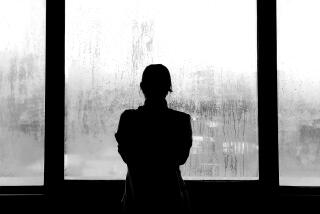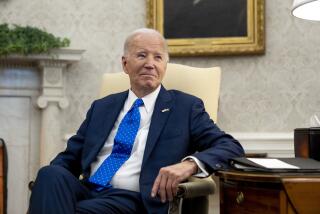Evelyn Freeman dies at 96; therapist was pioneer in aging issues
Evelyn Freeman, a pioneer in the field of aging who in the twilight of her life helped people cope with the challenges of getting older, has died. She was 96.
Freeman, who was the longtime director of the senior counseling program at what was then called the Center for Healthy Aging in Santa Monica, died Jan. 14 of old age at her Brentwood home, her close friend Antoinette O’Connor said.
Freeman was instrumental in adapting peer counseling techniques for seniors facing the difficult issues of aging, such as losing loved ones, isolation and stress from chronic pain. Inspired in part by her husband’s psychotherapy practice, she became a licensed therapist and trained other seniors to become counselors.
The program, which relies on volunteers 55 and older who are supervised by licensed psychotherapists, garnered worldwide acclaim from mental health professionals as a more cost-effective and personal way to comfort elderly people struggling with aging.
Sheila Segal, current director of the peer counseling program at the center, now called Wise & Healthy Aging, said Freeman spoke to her clients with a wit and grace that made them feel they were truly heard. “She could get her point across with such imagination and humor,” Segal said.
Freeman believed fiercely that people have the potential to change until they die, and she instilled that philosophy in the counselors she trained.
Colleagues admired Freeman’s ability to put clients at ease, usually with a bit of dramatic flair. When an elderly person repeatedly regaled her with the same story — a common occupational hazard — she pulled her chair close and listened intently to every detail again. At the end, she’d clasp her hands and shout, “I got it! I really got it!” They would get the point, and rarely told the story again.
A training manual Freeman wrote in 1986 has been used in programs as far-flung as Japan and Denmark and earned her mentions in books on aging by Betty Friedan and Jane Fonda.
“If I were to look for one word that describes what goes on here,” she told Fonda of her work at the center, “the word would be ‘joy.’ … The joy of doing something meaningful. The joy of knowing that you can enlarge your life at a time when many people think it gets smaller.”
Evelyn Louise Withrow was born Sept. 23, 1916, in Ellwood City, Pa., an industrial borough near Pittsburgh. She was the first of two daughters of Curtis and Hazel Withrow.
Her parents’ marriage ended when Evelyn was a toddler and her pregnant mother moved with her to Los Angeles. Hazel worked as a seamstress and eventually raised her children on a half-acre plot in Reseda, where they raised chickens and grew vegetables.
At the height of the Great Depression in 1933, Freeman graduated high school at age 16. After a fight with her stepfather, she worked as a live-in au pair for a pianist, Marvin Maazel. In 1936 she married Maazel’s brother-in-law Shep Burkett.
The couple lived in Westwood, where they raised two daughters. Because he frequently traveled for work, she started making jewelry, selling it in a local store. She also began volunteering at what is now Cedars-Sinai Medical Center, spending time with cancer patients and providing what she felt was basic emotional support that doctors didn’t have time for. The experience would later influence her decision to become a counselor.
Freeman soon became involved with protesting the anti-communist “witch hunts” of the early 1950s, bringing her daughters with her to picket the day Julius and Ethel Rosenberg were executed.
After her first marriage ended in the mid-1950s, she started dating clinical psychologist Albert Freeman in 1957. Their romance was complicated by his inability to commit to one relationship. So in 1962 she quit her job and sailed to Greece to meet one of her daughters.
On her birthday, he called her in Paris and asked her to come home and marry him. They wed three months later.
The pair lived a happy if unconventional life. Both openly took other lovers, and the group therapy sessions the couple held in their Brentwood home were often clothing-optional.
In her 2011 self-published memoir, Freeman wrote frankly about her extramarital affairs, taking a woman as a lover for nearly a decade, and the pains of negotiating an open marriage. She wrote later that the experiences taught her the value of relationships that were “unlike storybook romances or operatic tragedies.”
At age 55 she began college, earning her bachelor’s degree in psychology from a distance-learning program. In 1976 she received a master’s degree from Vermont-based Goddard College, and at 70 a doctorate from a local branch of the now-defunct Sierra University.
Freeman continued to work at the center, retiring at age 89. “People can change for as long as they live,” she wrote in a letter to her colleagues afterward. “And I’ve got a whole lot of living to do.”
She is survived by her husband of five decades, Albert; a daughter, Linda Burkett; a stepson, Fred Patterson; and one grandson. Her second daughter, Karol Supriano, died of multiple sclerosis in 2007.
More to Read
Start your day right
Sign up for Essential California for the L.A. Times biggest news, features and recommendations in your inbox six days a week.
You may occasionally receive promotional content from the Los Angeles Times.







